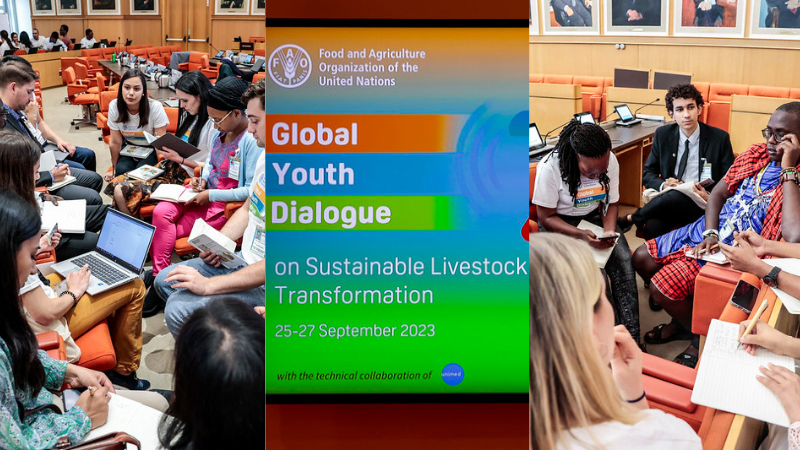Young farmers, trained at the WFO Gymnasium Program, participated in The Global Youth Dialogue on Sustainable Livestock Transformation, held in parallel with FAO’s Global Conference on Sustainable Livestock. This article shares their insights on youth involvement in crucial agriculture conversations.
The Global Youth Dialogue on Sustainable Livestock Transformation was an event by The Food and Agriculture Organization of the United Nations (FAO) held from the 25th to 27th of September in parallel with the Global Conference on Sustainable Livestock in Rome, Italy, at FAO premises. It offered a platform to global youth, enabling them to exchange their experiences and ideas to advocate for a sustainable future in the livestock sector. The Dialogue brought together delegates from various backgrounds, ranging from academia to farming, and allowed young people to engage with diverse stakeholders. This effort facilitated the inclusion of youth as an integral and crucial part of the discussion.
Within the Dialogue, the World Farmers Organisation (WFO) was represented by Ms Ana Carolina Zimmermann, a current WFO Gymnasium student, Ms Josiane Irakarama, a Gymnasium alumni, and Mr João Ricardo Morais from the WFO secretariat. They have participated in the Dialogues to ensure that the voice of farmers was heard during the discussions.They actively contributed to creating a youth statement, a product of more than 10 hours of negotiation. The statement emphasized ideas of youth and collective efforts required to pave the path towards a better future for the livestock sector.
Mr Joao Morais, who supports the WFO in building the WFO Young platform, had the opportunity to communicate the action points that emerged from the discussions during the Dialogue. He underlined the significance of providing capacity-building opportunities for young people involved in agriculture, enabling them to share their stories and expertise in international advocacy for a sustainable future. As an excellent example, he mentioned the WFO Gymnasium: a high-level capacity-building program that trains young farmers to become future leaders in the international agriculture sector.
Ms Josiane Irakarama’s insights on the Dialogue:
The thing that stood out most for me during my experience at the Global Youth Dialogue on Sustainable Livestock is that it was conducted with a Youth-Centered Approach and was very engaging because it was created by and for young people, emphasizing the importance of youth involvement in addressing sustainable livestock transformation.
- Youth Statement
The dialogue created a Youth Statement summarizing the key priorities and solutions identified during the event such as ways on how Livestock farming can attract more young people through education, story-telling, increased financial investment, and sustainable transition of the livestock sector, especially as it faces attacks by various raising anti-livestock movements The statement was presented to the participants of the Global Conference on Sustainable Livestock Transformation, highlighting the importance of youth voices in policy shaping.
- Platform for Ideas
The dialogue provided us a platform to express and exchange our ideas on sustainable livestock transformation, allowing us to contribute actively to the global discourse on this critical issue. Furthermore, the attendees had academic backgrounds in livestock, includinganimal science and veterinary medicine, and most importantly there were present farmers with practical experience from the field.Engagement with Stakeholders
We had the opportunity to engage with various stakeholders, including, producer organizations, researchers, development agencies, civil society, and the private sector, fostering collaboration and networking.
- Global Perspective
By connecting with youth from different countries and backgrounds, we gained a broader perspective on the challenges and opportunities in sustainable livestock transformation.
- Empowerment
The dialogue empowered young people to actively participate in shaping the future of livestock farming, recognizing them as vital contributors to sustainable agriculture and food security.
Ms Ana Carolina Zimmermann’s insights on the Dialogue:
- Context Matters
It is mandatory to take into account different contexts. Few of us had the opportunity to speak to Ministers from different regions of the world and it was clear that the challenges varied from country to country. For example, in the Netherlands, extensification is a possible solution for the problem they face with high levels of nitrogen, meanwhile, in Brazil intensification in livestock means efficiency, and it can be done while restoring the environment.
- Livestock as a part of the solution
Livestock can be part of the solution to mitigating and adapting to the climate change. That narrative is also important if we want to attract talented youth to the sector and achieve scale within the sustainable livestock transformation.
- Importance of trade
It is important that good practices are recognized, but it is imperative that they are rewarded. Farming must be a viable business in order to survive. If there is no market for sustainable farming, it is not likely that good practices will thrive.
- Youth in decision-making process
The Youth Dialogue was a great first step for bringing youth into the conversation. Now, in order to actively include youth, it is necessary to involve young farmers in the process of decision-making, whether at the plenary or connecting youth with their government representatives. We see great initiatives of capacity building and training youth that now need resources to gain scale impact on the next generation of farmers.
The World Farmers’ Organisation’s (WFO) Gymnasium, which is attended by Ms Ana Carolina and from which has graduated Ms Josiane, is a Higl-Level Capacity Building Program, launched in 2017 in collaboration with Bayer and Andreas Hermes Akademie (AHA), already trained and empowered 46 active young farmers around the world and provided them with more than 50 high-level advocacy opportunities at international conferences to effectively elevate the voices of global farmers into key policy-making arenas.
